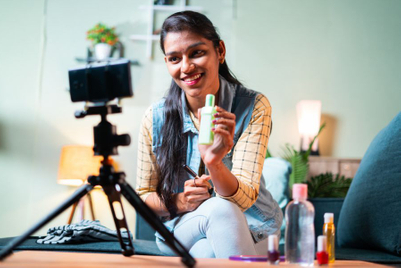
Earlier this month CyberBuzz, a leading influencer marketing consultancy in Tokyo, rolled out a programme designed to crack down on fake followers and help influencers to become more “professional”.
The measures include software to monitor fluctuations in follower numbers, manual assessment of engagement levels, and ongoing educational conferences. The move may seem overdue in a global context, but marketers in Japan are as yet relatively unconcerned about the impact of influencer fraud.
CyberBuzz CEO Akinori Takamura sees the problem increasing in Japan, but also anticipates a shift away from focusing on high numbers of followers to micro-influencers with fewer, more engaged followers.
How do you define someone as an ‘influencer’?
On Instagram, we say people with more than 10,000 followers. We have three groups of registered members. The most important is the ‘Ninari’, who are really strong influencers with around 1,000 members. The second we call ‘Ripre’, and these are around 13,000 people with blogs and Twitter and Instagram profiles. The third, ‘Pochicome’, has around 600,000 members but they are not selected by us, so we can’t really call them infuencers. Most companies request that influencers have more than 10,000 followers. In the future, we expect them to put more focus on micro-influencers — people who don’t have that many followers but whose followers are very engaged.
How big is the problem of influencer fraud in Japan?
We’ve talked a lot about fake followers and the problems this causes for marketers. The issue is not quite as serious as it is globally, but we do think it will become a more serious problem in the future. So the launch of our programme is pre-emptive.
Do clients really care?
No, they don’t care that much. They just care about the number of followers. In Japan people are more concerned about ad fraud and bad placements. I think people will become more concerned about fake followers though, as influencers are one of the main channels for consumers to search for information.
Why do you think the problem will become bigger?
At the moment, most influencers are professional ‘talent’, so they know their obligations and the rules around how to do it. But the younger generation of influencers, who have become influencers thanks to social media but are not professionals, don’t know and don’t care about things like copyright or using competing products [to those they are supposed to be promoting]. It has to do with the mindset, and we think we have to educate them to be more professional. Otherwise consumers will come to see them negatively.
How transparent is influencer marketing in Japan? Is there any punishment for transgression?
The JAAA gives guidelines but I think that some clients don’t want things to be transparent. Legally there are no punishments. A company faces a reputational risk if it does that sort of thing. We check every post by our members for transparency and those that aren’t [transparent], we put on a blacklist.
How do you go about educating influencers to be ‘professional’?
We give them guidelines through study conferences. We advise them on things like how to do marketing, how to post images, how to write copy.
It’s not easy to educate them because they’re often really amateur, but we should communicate better with them so the conferences are a good way. It’s really important to keep doing this kind of activity because I think the influencer market will become a lot bigger with the next generation.
What I think is most important is for people to learn to be more creative in their postings. At the moment, it’s normal for people just to post up a straight shot of a bottle or something. We want people to think about how they communicate — the tone, the message to get across to consumers — this sort of thing will become a lot more important.
How much money does an influencer typically make?
Brands calculate the cost based on individual followers, so the amount an influencer makes increases according to the number of followers they have. But we see this shifting to a system based on micro-influencers and engagement. Things could become more favourable if you’re a micro-influencer.
How would you calculate a micro-influencer’s value?
It’s difficult. We select them according to client needs, based on things like gender and age. But there aren’t that many of them. If we were working with a client in the automotive industry for example, we’d probably have to use all the existing micro-influencers because there are so few of them.
Can you monitor whether an influencer’s activity leads to actual sales?
Most companies don’t care about connecting influencer marketing to purchases. They see it as being more about branding. But of course, one of our goals in the future is to connect influencer activity to sales.
A global report recently showed that tobacco companies often use young influencers on social media. Do you think this is ethical?
I don’t like it. Tobacco companies do have to introduce new products, but I think people would view this negatively in Japan. We could probably find a way to use influencer marketing to shift the appeal from cigarettes to healthier products, but I don’t think most influencers want to market tobacco.


.jpg&h=334&w=500&q=100&v=20250320&c=1)
.jpg&h=334&w=500&q=100&v=20250320&c=1)
.jpg&h=334&w=500&q=100&v=20250320&c=1)




.png&h=334&w=500&q=100&v=20250320&c=1)

.png&h=334&w=500&q=100&v=20250320&c=1)

.jpg&h=268&w=401&q=100&v=20250320&c=1)




.png&h=268&w=401&q=100&v=20250320&c=1)
